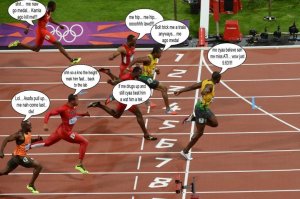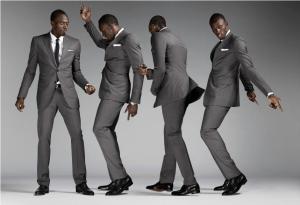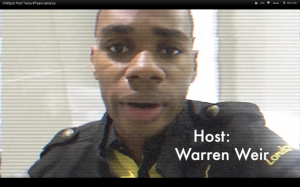




Just thought I’d post some of the interesting photos, articles and videos that I’ve collected off Twitter and Facebook about Usain Bolt and a few other Jamaican athletes. They give a better insight into Jamaica’s extraordinary athletes than you get from mass media. I think my favourite photo is the one of him with his coach, Glen Mills. You can clearly see the affection between them from the way Usain and Mills are talking to one another. Mills truly is a star in his own right; after all he’s responsible for training the two fastest men in the world today, Bolt and Yohan Blake, who won gold and silver in the Olympic 100m a couple of days ago. Would love to interview him but he dislikes media I understand.
Before that fateful race there were enough skeptics including Tim Layden who went on to write one of the best post-100m articles on Usain in Sports Illustrated. The quote below from a Slate article chronicles the widespread uncertainty about Bolt’s ability to prevail:
A couple of hours before today’s men’s 100-meter final, Sports Illustrated’s Tim Layden made a bold prediction on Twitter: “OK. Go big or go home. My 100m pick: 1) Gatlin 2) Bolt 3) Blake.” Layden wasn’t the only one who was betting against Usain Bolt. The Jamaican sprinter hadn’t run against a 100-meter field this stacked since 2009, when he set the world record of 9.58 seconds in Berlin. In 2011, a false start knocked him out of the world championships. At the Jamaican Olympic Trials earlier this year, he lost to Yohan Blake in both the 100 and 200 meters.

After the race Layden sang a different tune:
LONDON — In many ways, this one was better. Four years ago in China, Usain Bolt transformed the 100 meters into performance art, and the Olympics into a soliloquy, winning with such playful arrogance that it seemed less like a competition than a palette on which an emerging and transcendent talent could splash his greatness in great, broad strokes. The other sprinters were like extras in the Bolt Show, useful in the same way that painted planks of background scenery are deployed in a Broadway production. Bolt was bigger than all of them and so much faster. It wasn’t a race, it was an exhibition (and one that Bolt would repeat four days later in the 200 meters and again in the 4×100-meter relay; three gold medals and an unprecedented three world records. He did likewise a year later at the 2009 world championships in Berlin).
The world gathered again to witness Bolt on Sunday night in London’s Olympic Stadium. Many had surely not seen him since Beijing, as track and field lives on the distant margins of mainstream sport and Bolt is its only true star. In a superficial sense, he did not leave them wanting, winning the 100-meter gold medal in 9.63 seconds, an Olympic record and the second-fastest time in history (behind only his world record of 9.58 from Berlin) and .06 faster than he ran in Beijing. But this was not a virtuoso encore, this was a race, and it had begun more than two years earlier.
To read more go here:


Meanwhile on Foxsport.com Greg Couch lamented USA Track and Field’s lack of get up and go while ruefully noting Bolt’s casual, cool but deadly sporting style:
Usain Bolt posed again with Bolt Arms pointing to the sky, then put his hands behind his ears to get the crowd to yell for him more, as if they could. And then he sprinted his 200-meter heat Tuesday to an easy victory.
Well, actually, he sprinted about 125 of it, then jogged the other 75 to advance to Wednesday’s semifinals.
“I was taking it as easy as possible,’’ he said. “It’s my first (200) run. I’m looking forward to tomorrow.’’
This was basically a day off for Bolt, with a quick Olympic run mixed in. But there’s no day off in the Bolt buzz.
Let’s see: He tweeted back and forth with a Manchester United player, saying he wants to try out for the team. He snuck past one of the picky Olympic rules he complained about the other night, hiding a jump rope in the bottom of his bag. After saying he wasn’t going to celebrate winning the 100 because he needed sleep, he emerged in a picture with three female Swedish handball players, supposedly partying with him in his room at 3 a.m.
This isn’t to be critical of Bolt for any of that, by the way. As an American, I’m asking this:
Why can’t we have one of those? By “those’’ I mean Bolt. I wonder if the US is ever going to get Bolt, understand him, build from him. Meanwhile, it was just a few months ago that U.S. hurdler Lashinda Demus referred to track as “a dying sport.’’ It was just Sunday night that two million people wanting tickets to Bolt’s 100-meter race were turned away.

Well Greg, as i said in an earlier post, to ‘get’ Bolt, you have to get Jamaica. Getting Bolt to tour the USA is one way to approach it but understanding something about the ‘never say die’ nature of Jamaican culture would help too. The videos below might help illuminate this a bit. First a beautifully produced Gleaner video of Jamaicans watching, then celebrating Jamaican victory in the men’s 100m in one of Kingston’s busiest streets:
And finally there’s the third Jamaican…
Come tomorrow the world might want to know a little more about Warren Weir, the third Jamaican in the 200m at Olympics 2012. Incredibly Weir too is coached by Glenn Mills. As I write all three have cruised into the 200 m finals. The following video is a good introduction not only to Weir but also virtually the entire Jamaican team, Usain and all, getting ready for the Opening Ceremony…didn’t spot Yohan Blake…but a great peek behind the scenes at the Jamaican camp at Olympic Village. Check it out and #TeamUSA, take notes…
PS: If the copyright holders of any of the photos above identify themselves I will immediately credit them where necessary.






